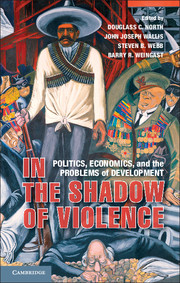Book contents
- Frontmatter
- Contents
- Contributors
- Acknowledgments
- One Limited Access Orders
- Two Bangladesh
- Three Fragile States, Elites, and Rents in the Democratic Republic of Congo (DRC)
- Four Seeking the Elusive Developmental Knife Edge
- Five Change and Continuity in a Limited Access Order
- Six India’s Vulnerable Maturity
- Seven Entrenched Insiders
- Eight From Limited Access to Open Access Order in Chile, Take Two
- Nine Transition from a Limited Access Order to an Open Access Order
- Ten Lessons
- Index
- References
Five - Change and Continuity in a Limited Access Order
The Philippines
Published online by Cambridge University Press: 05 December 2012
- Frontmatter
- Contents
- Contributors
- Acknowledgments
- One Limited Access Orders
- Two Bangladesh
- Three Fragile States, Elites, and Rents in the Democratic Republic of Congo (DRC)
- Four Seeking the Elusive Developmental Knife Edge
- Five Change and Continuity in a Limited Access Order
- Six India’s Vulnerable Maturity
- Seven Entrenched Insiders
- Eight From Limited Access to Open Access Order in Chile, Take Two
- Nine Transition from a Limited Access Order to an Open Access Order
- Ten Lessons
- Index
- References
Summary
The Philippines has exhibited characteristics of both a fragile and basic limited access order since independence in 1946, but the nature of the Philippine state has not been static. The country has experienced two critical junctures since independence, resulting in three distinct historical periods. Democratically elected representatives ruled the country from 1946 to 1972. The democratic experiment ended in 1972 when then incumbent president Ferdinand Marcos executed a coup against the system and began his rule as dictator. A nonviolent revolution ended Marcos’s authoritarian rule in 1986, and the country is once again ruled by democratically elected representatives.
These significant political changes were accompanied by changes in the nature of the country’s ruling coalition as well as the rents used to sustain the coalition (see Table 5.1). From 1946 to 1972, the country was dominated by a coalition of elite families and foreign capitalists who controlled access to economic and political power. The major source of wealth at independence was agricultural land, but this source was soon augmented by industrial policy-induced rents. The ruling coalition used these rents to secure loyalty and to defuse periodic violence from non-elite groups. The strategy was unsustainable, however, because the rent-creating policies did not produce enough resources to satisfy the increasingly restive non-elite groups. The threat of disorder and violence enabled Ferdinand Marcos to install himself as dictator in 1972.
- Type
- Chapter
- Information
- In the Shadow of ViolencePolitics, Economics, and the Problems of Development, pp. 149 - 197Publisher: Cambridge University PressPrint publication year: 2012
References
- 2
- Cited by



